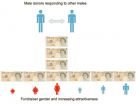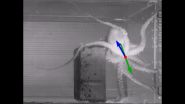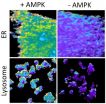(Press-News.org) This news release is available in French.
Quebec City, April 16, 2015--An international study led by researchers from Université Laval and CHU de Québec-Université Laval has identified significant vascular changes in the brains of people with Huntington's disease. This breakthrough, the details of which are published in the most recent issue of Annals of Neurology, will have significant implications for our understanding of the disease and could open the door to new therapeutic targets for treating this fatal neurodegenerative condition.
Huntington's disease (HD) is a hereditary neurodegenerative disorder that causes serious motor, cognitive, and psychiatric dysfunction and gradually leads to loss of autonomy and death. The disease develops in people age 40 to 50 on average. There is no cure and current treatments can only help control certain symptoms, but do not slow the neurodegenerative process. The disease affects roughly 1 in 10,000 people.
Although scientists have long known the cause of Huntington's disease, little is known about the physiological processes associated with it. Certain neurological diseases, such as Parkinson's and Alzheimer's, are accompanied by changes in the vasculature of the brain and in the blood-brain-barrier, the interface that controls exchanges between the blood and the central nervous system. The team led by Francesca Cicchetti, professor at the Université Laval Faculty of Medicine and researcher at CHU de Québec-Université Laval, examined the brains of people affected by HD or who had died from it as well as a murine model of the disease to determine whether these changes are also present in Huntington's disease.
The data collected shows the presence of mutant huntingtin, the protein responsible for the disease, in all major components of the brain's blood vessels. Affected brains also show higher blood vessel density and reduced blood vessel diameter. "The abnormalities observed within the cerebral blood vessels were accompanied by an increased permeability of the blood-brain-barrier, which could allow the pathological protein to propagate from the peripheral to the central nervous system," Professor Cicchetti noted.
"At the moment, we are still uncertain as to how this contributes to the development or progression of the disease," Professor Cicchetti added. "However, these results, along with our observations published in the same journal last year, strongly suggest that the disease is not solely the result of a phenomenon that is intrinsic to the cells--i.e., the product of a genetic mutation--but rather that healthy cells can also be infected by the mutant protein."
These findings open up new avenues for treating Huntington's disease. "If indeed the transport of the mutant protein is facilitated by an increased permeability of the blood-brain-barrier, we could consider developing therapies aimed at reestablishing its integrity and preventing diseased peripheral cells from migrating to the brain," the researcher concluded.
INFORMATION:
In addition to Francesca Cicchetti, the study's co-authors are: Janelle Drouin-Ouellet, Giulia Cisbani, Marie Lagacé, Martine Saint-Pierre, Wael Alata, Isabelle St-Amour, Frédéric Calon, Steve Lacroix (Université Laval); Stephen J. Sawiak, Wei-Li Kuan, Sarah L. Mason, Roger A. Barker (University of Cambridge); Richard J. Dury, Penny A. Gowland, Susan T. Francis (University of Nottingham).
Information:
Francesca Cicchetti
Université Laval
CHU de Québec-Université Laval
418-525-4444 ext. 48853
Francesca.Cicchetti@crchul.ulaval.ca
If you are looking to raise money online for your favorite cause, listen up. A real-world analysis of human behavior reported in the Cell Press journal Current Biology on April 16 shows that men treat online giving as a competitive enterprise. Men will donate four times more money to an attractive female fundraiser in response to the contribution of another male.
Researchers say that they suspect this tendency is a subconscious part of human psychology that exists because it is (or was) evolutionarily beneficial to us.
"People are really generous and are right, a lot ...
The body plan of octopuses is nothing if not unique, with a sophisticated brain in a soft, bilaterally symmetrical body, encircled by eight radially symmetrical and incredibly flexible arms. Now, researchers reporting the first detailed kinematic analysis of octopus arm coordination in crawling show that the animals have a unique motor control strategy to match their "odd" form. The researchers report their findings in the Cell Press journal Current Biology on April 16.
"Octopuses use unique locomotion strategies that are different from those found in other animals," ...
Bacteria that naturally reside in the gut are important for health, but recent studies consistently show that a modern lifestyle depletes the gut's collection of microbes. How lifestyle affects the diversity of this gut "microbiome" is unclear, but an analysis of the gut microbiomes of Papua New Guinean and US residents in Cell Reports now suggests that western lifestyle may diminish the variety of bacteria in the gastrointestinal tract by limiting their ability to be transmitted among humans.
"There are several aspects of western lifestyle that have been hypothesized ...
Oral infections are the most common diseases of mankind and are also a key risk factor for heart disease, which is the leading cause of death worldwide. In a review article published in Trends in Endocrinology and Metabolism on April 16, researchers summarize the latest clinical evidence supporting a link between oral infections, which are caused by the bacteria in our mouth, and heart disease, and they emphasize the important role of inflammation in both of these conditions.
"Given the high prevalence of oral infections, any risk they contribute to future cardiovascular ...
By analyzing the activity of "GPS" neurons in mice, researchers at the Stanford University School of Medicine have discovered that the mental maps created by these cells accumulate errors, which are corrected when the animal encounters a wall.
The findings support the theory that these cells, called grid cells, use an animal's perceived speed and direction to help it navigate familiar places.
Thus, as you stumble through your pitch-black kitchen in the middle of the night for a glass of water, your body knows how many steps to take and when to turn to get to the sink. ...
Men give more money through fundraising websites after seeing that other men have donated large amounts and when the fundraiser is an attractive woman, according to new UCL and University of Bristol research.
The scientists say this response by men is unlikely to be conscious and could have an evolutionary function as theories predict that generous actions can honestly signal hidden qualities, such as wealth or desirable personality attributes, to potential partners.
Co-author Dr Nichola Raihani from UCL (Life Sciences), said: "We looked at why people behave generously ...
A nerve neglected in today's era of molecular and genetic analysis has yielded a surprising secret. A handful of neurons control breathing in a fine-tuned but powerful way, scientists have discovered in mice. Among these sensory neurons, two types are dedicated to two specific respiratory functions.
The findings, published in Cell, suggest new ways of considering clinical conditions related to the vagus nerve.
The team, led by Stephen Liberles, Harvard Medical School associate professor of cell biology, has effectively deconstructed the vagus nerve, a key connection ...
The enzyme AMPK initiates a dizzying array of cellular activities, from breaking down worn-out cellular parts to turning on energy production. How does a single protein, activated by a single switch, fulfill so many different tasks without getting them mixed up? To get at such a complex question, cell biologists at Johns Hopkins designed several molecular tools that allowed them to watch, measure and manipulate the activity of the enzyme AMPK in individual compartments within the cell. The new tools have confirmed that at least some of AMPK's ability to multitask comes ...
Angiogenesis inhibitors--a widely used class of cancer drugs designed to shrink tumors by preventing them from forming new blood vessels--often work in the short term, but usually become ineffective within months. Now, a team led by UC San Francisco scientists has discovered a possible reason, one that could lead to a way to address the problem and prevent cancer relapse.
Working with laboratory models of pancreatic and breast cancer, the scientists found that myeloid cells, which originate in bone marrow and are part of the body's first-line of defense--the so-called ...
How does climate change affect the occurrence and distribution of species? This is a key question in the climate debate, and one that is hard to answer without information about natural variation in species abundance. Now researchers from Uppsala University can, for the first time, give us a detailed picture of natural variation through a major study published today in the leading scientific journal Current Biology.
The impact of climate change on species occurrence and distribution is a central issue in the climate debate, since human influence on the climate risks posing ...



